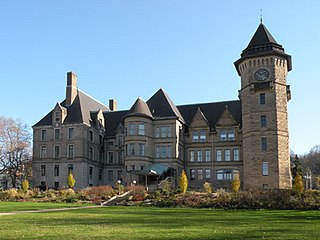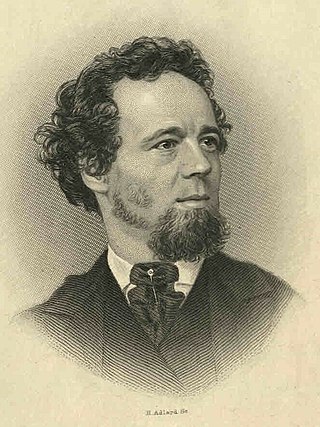Related Research Articles

The Nineteenth Century was a British monthly literary magazine founded in 1877 by James Knowles. It is regarded by historians as 'one of the most important and distinguished monthlies of serious thought in the last quarter of the nineteenth century'.
The Black Dwarf (1817–1824) was a satirical radical journal of early 19th century Britain. It was published by Thomas Jonathan Wooler, starting in January 1817 as an eight-page newspaper, then later becoming a 32-page pamphlet. It was priced at 4d a week until the Six Acts brought in by the Government in 1819 to suppress radical unrest forced a price increase to 6d. In 1819 it was selling in issues of roughly 12,000 to working people such as James Wilson at a time when the reputable upper-middle class journal Blackwood's Magazine sold in issues of roughly 4,000 copies.

The Westinghouse Air Brake Technologies Corporation was founded on September 28, 1869 by George Westinghouse in Pittsburgh, Pennsylvania. Earlier in the year he had invented the railway air brake in New York state.

The Cornhill Magazine (1860–1975) was a monthly Victorian magazine and literary journal named after the street address of the founding publisher Smith, Elder & Co. at 65 Cornhill in London. In the 1860s, under the editorship of William Makepeace Thackeray, the paper's large circulation peaked around 110,000. Due to emerging competitors, circulation fell to 20,000 by 1870. The following year, Leslie Stephen took over as editor. When Stephen left in 1882, circulation had further fallen to 12,000. The Cornhill was purchased by John Murray in 1912, and continued to publish issues until 1975.
The Sporting Life was a British newspaper published from 1859 until 1998, best known for its coverage of horse racing and greyhound racing. Latterly it has continued as a multi-sports website.

James Greenwood (1832–1927) was an English social explorer, journalist and writer, who published a series of articles which drew attention to the plight of London's working poor. He was one of the first journalists to cover stories incognito, and is regarded as one of the pioneers of investigative journalism.

Sir Edward Hulton, 1st Baronet was a British newspaper proprietor and thoroughbred racehorse owner.
Samuel Ralph Townshend Mayer (1841–1880) was a British journalist and writer, the founder of the Free and Open Church Association.

The European Magazine was a monthly magazine published in London. Eighty-nine semi-annual volumes were published from 1782 until 1826. It was launched as the European Magazine, and London Review in January 1782, promising to offer "the Literature, History, Politics, Arts, Manners, and Amusements of the Age." It was in direct competition with The Gentleman's Magazine, and in 1826 was absorbed into the Monthly Magazine.
Bell's Weekly Messenger was a British Sunday newspaper that began publication on 1 May 1796, under proprietorship of John Bell. Initially a Sunday paper, from 1799 the London edition was reprinted on Monday for nationwide distribution. By 1803, it was selling 6,000 copies a week, at sixpence a copy. In 1799 there was even an augmented reprint of the previous year's editions, under the title Bell's Annual Messenger, printed for international distribution under the auspices of the East India Company.
The Academy was a review of literature and general topics published in London from 1869 to 1915, with a period from 1902 to 1905 when it was retitled The Academy and Literature. It was founded by Charles Appleton.
Bradbury & Evans (est.1830) was an English printing and publishing business founded by William Bradbury (1799–1869) and Frederick Mullett Evans (1804–1870) in London.
Belgravia was a monthly London illustrated literary magazine of the late 19th century that was founded by Mary Elizabeth Braddon.
Manchester Evening Chronicle was a newspaper established by Sir Edward Hulton, a Manchester City chairman, a newspaper proprietor and a racehorse owner. It started publication in 1897, was renamed Evening Chronicle in 1914 but stayed in Manchester. It continued publication under various ownerships until 1963, when it was merged with the more successful Manchester Evening News and discontinued publication.
Joseph Clinton Robertson (c.1787–1852), pseudonym Sholto Percy, was a Scottish patent agent, writer and periodical editor. He was a political radical prominent in the early days of the working-class press in London, and in the debates within the Mechanics Institute movement.
The Sporting Chronicle, known colloquially as The Chron, was a Manchester-based, daily, national horse racing newspaper which operated in Great Britain for 112 years until its closure in 1983 due to unsustainable losses. The last edition was published on 23 July of that year.

Edward Hulton (1838–1904) was a British newspaper proprietor in Victorian Manchester. Born the son of a weaver, he was an entrepreneur who established a vast newspaper empire and was the progenitor of a publishing dynasty.

Knowledge: An Illustrated Magazine of Science was a British popular science magazine published from 1881 to 1918. Founded by astronomer Richard A. Proctor, the magazine started as a weekly periodical, becoming monthly in 1885. The magazine was known for its extensive correspondence columns. Proctor himself, the first editor, was a significant contributor, and many of his discoveries or theoretical deductions first appeared in the magazine. Proctor was sometimes assisted in editorial duties by Edward Clodd. After Proctor's death in 1888, Arthur Cowper Ranyard took over editorship, then Harry Forbes Witherby after Ranyard's death.

The Atlas was a weekly newspaper published in England from 1826 to 1869.
Elliot Stock was an English publisher and bibliophile who collected first editions. The publishing company that bore his name was in business from 1859 to 1939.
References
Citations
- ↑ Brake & Demoor 2009, p. 568
Bibliography
- Brake, Laurel; Demoor, Marysa, eds. (2009), "Servant's Magazine (1838–1869)", Dictionary of Nineteenth-Century Journalism, Academia Press, ISBN 978-90-382-1340-8